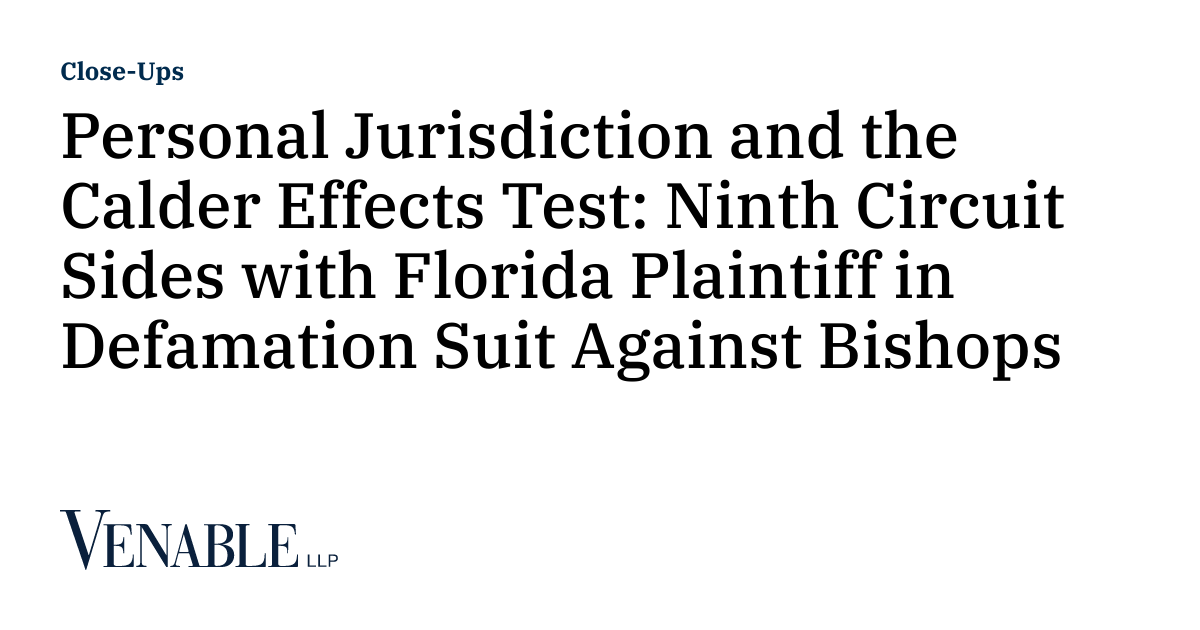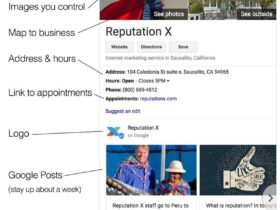On June 3, 2022, the Ninth Circuit Court of Appeals held that an Arizona district court erred in dismissing a defamation suit for lack of personal jurisdiction. The suit was brought by an attorney against three Catholic bishops and their respective dioceses located in Pennsylvania, New Jersey, and Ohio. See Burri L. PA v. Skurla, No. 21-15271, 2022 WL 1815827 (9th Cir. June 3, 2022).
According to the complaint, Plaintiff alleged that Defendants made defamatory statements about him to individuals in Arizona. Plaintiff alleged that these communications were designed to interfere with a contract that Plaintiff had with the Phoenix Eparchy in Arizona. Defendants also allegedly repeated these defamatory statements about Plaintiff at a meeting with multiple representatives from the Phoenix Eparchy, where they urged the Phoenix Eparchy to drop a prior action that Plaintiff had brought on behalf of the Phoenix Eparchy against Defendants in Arizona. Based on Defendants’ conduct and communications, Plaintiff filed a lawsuit against Defendants in Arizona for defamation and tortious interference.
In Arizona, due process requires that non-resident defendants have sufficient “minimum contacts” with Arizona to establish specific personal jurisdiction. See Int’l Shoe Co. v. Washington, 326 U.S. 310, 316 (1945) (quoting Milliken v. Meyer, 311 U.S. 457, 463 (1940)). In intentional tort cases, the Ninth Circuit has interpreted the “minimum contacts” inquiry as satisfied when the defendant (1) purposefully directed activities toward the forum state, (2) the plaintiff’s claim arises out of or relates to those activities, and (3) an exercise of jurisdiction would be reasonable. See Dole Food Co. v. Watts,303 F.3d 1104, 1111 (9th Cir. 2002). If the plaintiff establishes the first two components of this inquiry, the burden shifts to the defendant to “present a compelling case that the exercise of jurisdiction would not be reasonable.” LNS Enters. LLC v. Cont’l Motors, Inc., 22 F.4th 852, 859 (9th Cir. 2022) (quoting Axiom Foods, Inc. v. Acerchem Int’l Inc., 874 F.3d 1064, 1068-69 (9th Cir. 2018)).
The Ninth Circuit uses the Calder effects test to analyze the first component of the “minimum contacts” inquiry. See Dole Food Co. v. Watts,303 F.3d 1104, 1111 (9th Cir. 2002). In Calder v. Jones, the Supreme Court employed a three-part test to establish personal jurisdiction in an intentional tort suit, and this test focuses on harm caused by the defendant. See Calder v. Jones, 465 U.S. 783, 788-89 (1984). The Supreme Court recently clarified the scope of the Calder effects test by explaining that courts cannot look solely at the harm caused by the defendant and must also consider the defendant’s conduct and contact with the forum state. See Walden v. Fiore, 571 U.S. 277, 289-90 (2014). The Ninth Circuit applies the Calder effects test to the first component of the traditional “minimum contacts” inquiry. The Calder effects test states that a defendant has purposefully directed conduct at the forum state if they (1) commit an intentional act, (2) expressly aimed at the forum state, that (3) causes harm the defendant knew was likely to be suffered in the forum state.
In the suit brought against the Catholic bishops, the district court found that Defendants did not purposefully direct conduct toward Arizona sufficient to satisfy the first component of the due process “minimum contacts” test. The district court subsequently granted Defendants’ motion to dismiss for lack of personal jurisdiction without addressing the other two components of the test.
In addressing whether Defendants had purposefully directed activities toward Arizona, the Ninth Circuit applied the Calder effects test, and held that the first part of the Calder effects test was met. Defendants’ alleged communication of defamatory statements was in response to the lawsuit that Plaintiff had previously brought on behalf of the Phoenix Eparchy against Defendants in Arizona. These statements that Plaintiff was “greedy, incompetent, and inexperienced” while seeking to “make a name for himself” through a lawsuit with “absolutely no legal merit” constituted an intentional act. Defendants also allegedly requested multiple times “that the Phoenix Eparchy terminate the contract with” Plaintiff. The Court found that this interference with Plaintiff’s contract was an intentional act.
Applying the second part of the Calder effects test, the Ninth Circuit found that Defendants’ actions designed to interfere with an Arizona contract and Arizona lawsuit were expressly aimed at Arizona. An act will be found to target the forum state if the purpose is to cause harm in the forum state. See Brainerd v. Governors of the University of Alberta, 873 F.2d 1257 (9th Cir. 1989).Plaintiff alleged that Defendants’ intended conduct and communications includedwritten correspondence and phone calls regarding Plaintiff’s activities in Arizona. These statements were directed to Arizona and circulated in that state with an alleged intent to convince the Phoenix Eparchy to terminate the Arizona contract with Plaintiff and drop the action that Plaintiff had previously filed against Defendants in Arizona.
According to the Ninth Circuit, the third part of the Calder effects test was satisfied. By circulating statements about Plaintiff in Arizona, Defendants knew or should have known that this conduct would negatively affect Plaintiff’s reputation in that state. See Keeton v. Hustler Magazine, Inc.,465 U.S. 770 (1984). Defendants could have anticipated that their communications designed to undermine Plaintiff’s employment contract with the Phoenix Eparchy would cause Plaintiff harm in Arizona.
The Ninth Circuit found that Plaintiff’s allegations were enough to show at the pleading stage that Defendants’ alleged acts met the Calder effects test and were thus activities “purposefully directed” toward the forum state. Therefore, Plaintiff’s asserted allegations were enough to satisfy the first component of the “minimum contacts” inquiry and survive Defendants’ motion to dismiss for lack of personal jurisdiction. The Ninth Circuit vacated the district court’s dismissal of Plaintiff’s claims against Defendants and remanded the case to the district court to complete the additional two components of the due process “minimum contacts” inquiry. See Dole Food Co. v. Watts,303 F.3d 1104, 1111 (9th Cir. 2002).
The case reiterates that if a Defendant’s contacts with the forum satisfy the Calder effects test, Ninth Circuit courts will likely determine that the first component of the minimum contacts inquiry has been met.
* With thanks to Summer Associate Julia Su Qi Gan for her assistance in writing this article.













